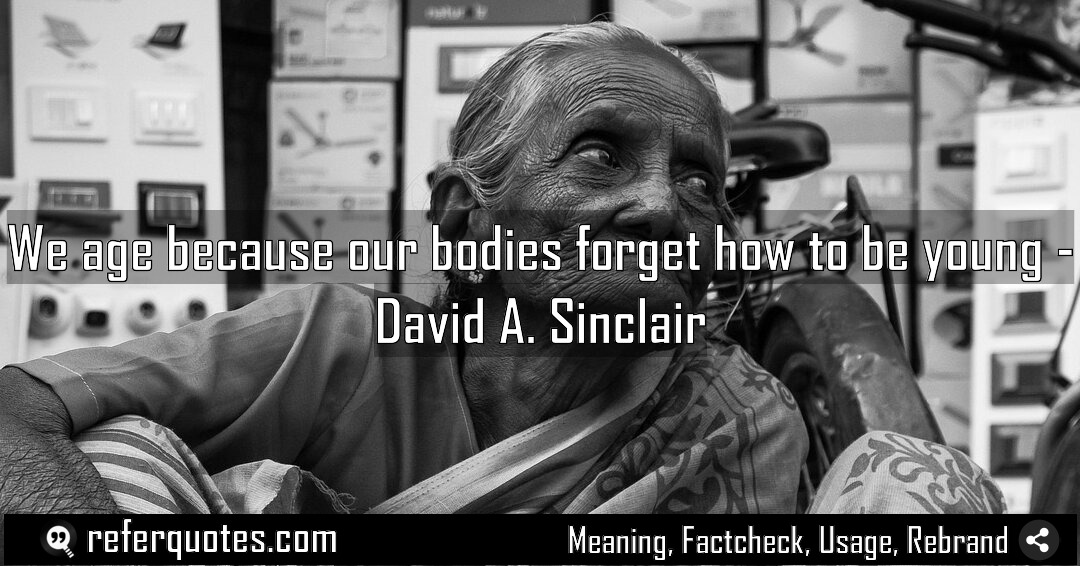
You know, that line from David Sinclair, “We age because our bodies forget how to be young,” really flips the script on aging. It’s not about things just breaking down from wear and tear. It’s an active process, a loss of information. Our cells literally lose the instructions to be youthful. It’s a profound shift in perspective.
Share Image Quote:
Table of Contents
Meaning
At its core, this quote means aging isn’t passive decay. It’s an active biological process where our cells lose the epigenetic information—the “software”—that tells them how to function in a youthful, healthy state.
Explanation
Okay, so think of it like this. We’re taught that aging is like a car that slowly rusts and its parts wear out. Right? But Sinclair’s big idea is that it’s more like a scratched CD. The information—the music, the data—is all still there on the disk. But the player, your body, can’t read it properly anymore because of all the scratches. Those scratches are epigenetic noise. Our genes don’t change, but the instructions for which genes to turn on and off get corrupted. The body forgets the playlist of youth and starts playing the wrong tracks. That’s the forgetting. It’s not that the body can’t repair itself; it’s that it’s lost the blueprint for what a proper repair looks like.
Quote Summary
Reading Level85
Aesthetic Score90
Origin & Factcheck
This quote comes straight from David A. Sinclair’s 2019 book, Lifespan: Why We Age—and Why We Don’t Have To. It’s a central thesis of his work, not just a passing remark. You sometimes see similar sentiments floating around, but this specific phrasing is uniquely his, born from decades of his research at Harvard Medical School in the United States.
Attribution Summary
Where is this quotation located?
| Quotation | We age because our bodies forget how to be young |
| Book Details | Publication Year: 2019; ISBN: 978-1501191978; Last edition: 2020; Number of pages: 432. |
| Where is it? | Chapter 2: The Information Theory of Aging, Approximate page 59 from 2019 edition |
Context
In the book, he uses this concept to build a incredibly hopeful argument. He’s laying the groundwork to say that if aging is simply a loss of information—a forgetful body—then in theory, we can find a way to reboot the system. We can remind the body of its youthful state. This isn’t just philosophy; it’s the basis for his research into molecules that might one day act as that reboot.
Usage Examples
I find this quote is a game-changer for a few different conversations.
- For the Biohacker Crowd: Instead of just talking about “optimizing” or “slowing decline,” you can frame your goals as “preserving epigenetic information.” It shifts the focus from defense to proactive maintenance of your biological data.
- For a Skeptical Friend: When someone says “aging is just inevitable,” this quote is a perfect counter. You can say, “Well, what if it’s not inevitable? What if it’s just a communication problem our bodies have learned?” It opens up a whole new line of thinking.
- In a Leadership or Business Context: It’s a powerful metaphor for corporate culture. A company doesn’t fail because the market is tough; it fails because it forgets its core innovative spirit. It loses the “information” that made it great in the first place.
To whom it appeals?
Share This Quote Image & Motivate
Motivation Score80
Popularity Score82
Shareability Score86
FAQ
Question: Is this just a metaphor, or is there real science behind it?
Answer: It’s a powerful metaphor for a very real biological theory—the Information Theory of Aging. Sinclair’s lab has published work, particularly on epigenetics, that provides a mechanistic backbone for this idea. It’s a leading hypothesis, not just a poetic thought.
Question: What kind of “information” is the body forgetting?
Answer: Primarily, it’s the epigenetic information. Think of it as the software that runs on the hardware of your DNA. It’s the complex set of chemical markers and tags that tell a skin cell to be a skin cell and a liver cell to be a liver cell, and to do their jobs correctly. With age, this software gets buggy.
Question: So, if we can “remind” the body, does that mean reversing aging is possible?
Answer: That is the multi-billion dollar question. Sinclair’s research and that of others in the field is predicated on the idea that it is possible. They’ve shown age reversal in animal models by resetting epigenetic markers. The big, huge, monumental challenge is doing it safely and effectively in humans. But the theory says it’s not a fantasy.
Question: How is this different from the “wear and tear” theory?
Answer: The wear and tear theory is passive. Things break. The Information Theory is active. It’s not that the parts are broken, it’s that the instructions for using and repairing them are corrupted. It’s the difference between a engine seizing from lack of oil (wear and tear) and a car driving off a cliff because the GPS gave it a wrong, corrupted command (loss of information).
Similar Quotes
We don’t have to accept aging as inevitable. It’s a radical shift from thinking we’re just passengers on the aging train to realizing we might be the engineers. This quote…
To slow aging, we must first change our minds. It’s a profound shift from seeing aging as an inevitable decline to viewing it as a malleable process we can influence.…
You know, when David Sinclair says “Aging isn’t a failure of the body,” he’s completely flipping the script. It’s not about our biology letting us down, but about our own…
Aging will be remembered as a condition we once accepted… but what if it’s not inevitable? David Sinclair reframes aging from a fact of life into a solvable problem, a…
We can’t cure aging by accepting it as natural. This quote from David Sinclair flips a core assumption on its head, arguing that our passive acceptance is the very thing…
